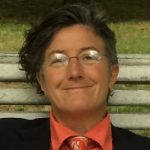Phoebe Godfrey
Professor in Residence of Sociology
EDUCATION:
PhD, 2001, SUNY Binghamton,
MA, 1998, SUNY Binghamton,
MA, 1995, International Educational Development, Teachers College – Columbia University
BA, 1988, English, Rutgers University
BIOGRAPHICAL STATEMENT:
“An ounce of practice is worth more than tons of preaching.” Gandhi
Phoebe has come to recognize the truth of Gandhi’s wisdom and so her interests are focused on how to put her personal commitments to equality, justice and ecological / social sustainability into practice through her research, teaching, activism and art, all of which she sees as inseparable. To this end she teaches courses on Society and Climate Change, Sustainable Societies, Sociology of Food, as well as Social Theory and is currently developing a new course Human Societies and the Living Earth. In all these courses she focuses on student engagement and empowerment through creative critical thinking, as well as embodied health and healing. She sees her teaching as activism and seeks to invite students to collectively find ways to put social justice ideas into practice. In addition, she seeks to help students develop their own academic and professional skills in multiple ways including publishing with them, working with honors students, supporting student research, activism, grants and other areas of interest.
This commitment to highlighting practice and not just ‘preaching’ is showcased in her first book Understanding just sustainabilities from within: A case study of a shared-use commercial kitchen in Connecticut, published summer 2021 by Routledge.
She is also the co-editor of another book focused on ‘just sustianablities’ Global [Im]-Possibilities: Exploring the Paradoxes of Just Sustainabilities, also being published summer of 2021 published by Zed Books / Bloomsbury Press.
Her other two co-edited volumes Systemic crises of global climate change: Intersections of race, class and gender (2016) and Emergent possibilities for global sustainability: Intersections of race, class and gender (2016) are also both published by Routledge and are the ones she uses in her classes Society and Climate Change and Sustainable Societies. She also plans to use her forthcoming books in her Sociology of Food course.
SELECTED PUBLICATIONS:
Published Books:
Godfrey, P. (2021). Understanding just sustainabilities from within: A case study of a shared-use commercial kitchen in Connecticut. London: Routledge.
Godfrey, P. & Buchanan, M.1 (2021) (Eds.). Global [Im]-Possibilities: Exploring the Paradoxes of Just Sustainabilities, London: Bloomsbury Press. (edited with a graduate student)
Godfrey, P. & Torres, D. (Eds.). (2016). Systemic crises of global climate change: Intersections of race, class and gender. London: Routledge. [make a hyper link https://www.routledge.com/Systemic-Crises-of-Global-Climate-Change-Intersections-of-race-class-and/Godfrey-Torres/p/book/9780815359173 ]
Godfrey, P. & Torres, D. (Eds.). Emergent possibilities for global sustainability: Intersections of race, class and gender (2016) [make a hyper link https://www.routledge.com/Emergent-Possibilities-for-Global-Sustainability-Intersections-of-race/Godfrey-Torres/p/book/9780815364566#:~:text=Emergent%20Possibilities%20for%20Global%20Sustainability%20is%20an%20interdisciplinary%20collection%20which,class%20through%20an%20intersectional%20lens]
External Reviews of Published Books:
Purkayastha, B., & Khan, K. (2019) Journal of Transdisciplinary Peace Praxis (JTPP), 1, (1), 191. Retrieved from https://jtpp.uk/current-issue-download/
MEDIA:
Northern Arizona University Summer Seminar Series
The Embodiment of the Self: Race, Class, Gender, and the Cultural Construction of Nature
Godfrey will explore, based on research and teaching, how the social intersections of race, class and gender shape our cultural constructions of our bodies, and thus of nature. She will unpack how in Western culture bodies that are deemed inferior as a result of the intersections of racism, sexism and classism are the same bodies that are deemed to be ‘closer to nature’, ‘wild’ and / or ‘savage’. As such, addressing our societies’ ongoing violence towards BIPOC / women / LGBTQ+ peoples (and the consequential traumatic internalization of these experiences of violence), must be juxtapositioned with the on-going global environmental destruction and, ultimately, with climate change. Finally, Godfrey will propose that to heal these inseparable crises requires that we deconstruct our collective illusionary social identities, in order to engage in the ‘embodiment of the Self’ – bringing us as individuals and as a society back to a more accurate construction of nature, and therefore of our collective / selves.

| phoebe.godfrey@uconn.edu | |
| Phone | 860-486-4416 |
| Office Hours | Tuesdays: 1-2PM, In Person or WebEx: By appointment |